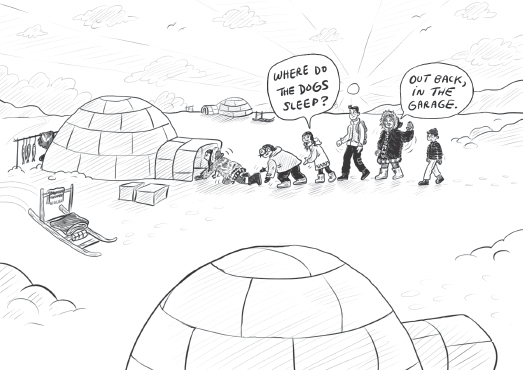CHAPTER 39

Our new friends took us to where they had erected a temporary shelter.
An igloo!

“Our village is farther south,” explained the elder once we were all snug inside the cozy dome of ice blocks. “But my good friend, your husband, Thomas Kidd, requested that we come north to keep an eye on ‘the most valuable treasures in the world.’ His family.”
“Whoa,” I said. “You know our dad?”
The elder nodded. “Many years ago, when he was taking cold-weather survival training in Greenland for his work at the Agency, I was his instructor. One day, I clumsily slipped and fell through a fishing hole in the ice. Your father dove in after me. Fortunately, he is a very excellent diver. He can hold his breath for a very long time.”
“We all know how to do that,” said Beck. “Holding your breath for a really long time is a skill you need to hunt treasure on shipwrecks. And when you live with Bick, the human stink bomb.”
The elder laughed. “Be that as it may, I owe my life to your father. So when he called, we came right away.”
“Thanks,” said Tommy, who was winking at the pretty girl. “You know, you’re such a hottie, I’m surprised the walls aren’t melting.”
“Forgive my son,” said Mom. “He falls in love at least twice a day.”
“Nuh-uh,” said Tommy. “This is for reals.”
The girl smiled at Tommy. Beck and I rolled our eyes at each other.
“Her name is Nagojut,” said the elder. “She is my granddaughter.”
“Her name is beautiful—just like the rest of her,” said Tommy. “What does Nagojut mean?”
“‘Friendly one.’”
“Ohhh,” said Tommy. “I like the sound of that!”
Since we were all starving, we chowed down on akutaq and bannock. That’s berries mixed with blubber smeared on top of flatbread. Kind of the PB and J of the North Pole. It was pretty good, in an “I’m so hungry I’ll eat anything no matter how disgusting it looks, smells, or tastes” kind of way.

After we ate, the elder, whose name we learned was Sata Adjuk, explained a little bit about how the Inuit build an igloo, or snow hut.
“We cut the blocks of snow by hand with a knife. The warmth inside mixed with the cold wind outside will cement the snow blocks together firmly. The air pockets in the snow act like insulation…”
While he told us all this, I noticed that Mom kept fidgeting with the Russian satellite telephone.
“You okay, Mom?” asked Tommy, because he saw it too.
She gave us a weak grin. “Just worried about your father. At least I have you guys and our new Inuit friends. He’s all alone, wherever he is.”
“He’ll be fine,” I said, even though I was starting to worry too.
“I’m not so sure about that, Bick,” said Storm. “If we’re on the wrong trail to find the stolen art, then Dad might be on the right one. He could be close to finding the Enlightened Ones’ secret hiding spot. If so, he’s probably in danger, big-time.”
Storm. She always says whatever’s on her mind, even when you sort of wish she wouldn’t.
“Your father has many friends,” said Sata, “in many corners of the world. If he is facing danger, he will not need to face it alone.”
“You’re right,” said Mom. “But I wish I could share this new clue with him. He needs it more than we do.”
“So text it to him,” said Tommy.
“There’re no cell towers this far north, hon,” said Mom. “We’re too far from the ship for Wi-Fi. And I don’t think this igloo is wired for the Internet.”
“So?” I said. “Use the satellite phone.”
Mom hesitated. “The Russians will, most likely, intercept the message and read it.”
“That’s okay,” said Beck. “They’re the ones who gave us the fourth clue. They want Dad working on finding their stolen art as much as we do.”
Mom nodded.
She powered up the satellite phone. The status indicator glowed green. She thumbed in a quick note to Dad:
No longer actively searching for missing Russian masterpieces at the North Pole.
Check out the fourth clue, received at Hermitage Museum.
She attached a photo of the clue and hit send.
“Now,” she said, “let’s just hope your father is someplace where it’s one hundred and three above even when you’re thirty-five below!”
Yep. Whatever that means.